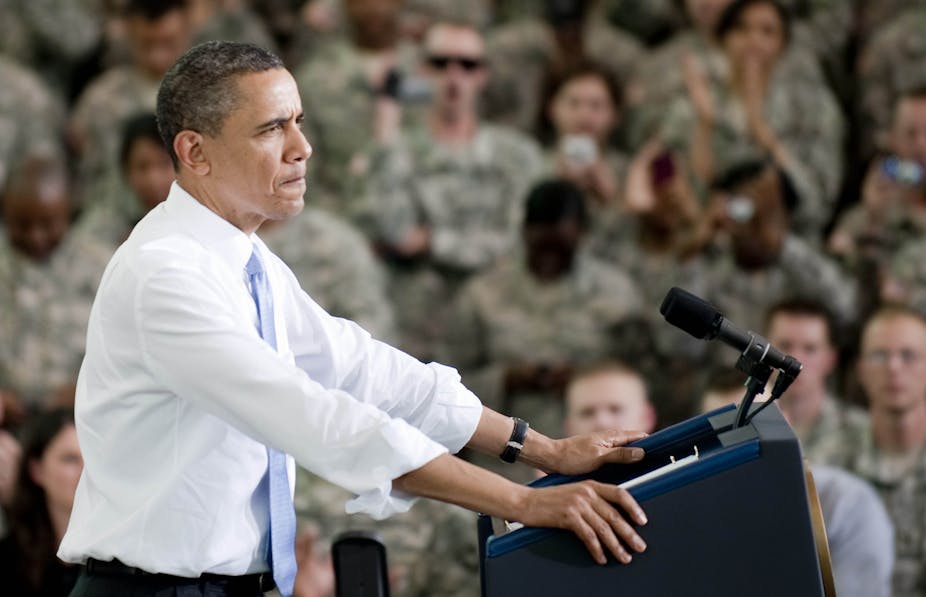In the extensive debate about the killing of Osama bin Laden there has been very little discussion of the legal (and possibly moral) aspects of the US operation. This is especially true in the United States, where the focus has been, not unnaturally, on what might be seen as the cathartic impact of the man’s removal.
International law has an uncomfortable but intimate relationship with the political priorities of governments and often has to give way to the political reality of particular situations.
This interaction was particularly evident in the case of bin Laden and must have presented President Obama with major dilemmas as he decided on his course of action.
The political demands on him must have been immense and immediate. The legal issues would have been less compelling.
While whatever decision the President reached was certain to displease many, it would appear that he handled the competing demands with a degree of subtlety.
International law and the goal of promoting the rule of law in a complex community of states is, nevertheless, important and, in this instance, bears considerable significance that should not be overlooked in the euphoria accompanying bin Laden’s death.
This significance bears on the United States’ inherently ambivalent attitude towards the rule of law, to the on-going “unauthorised” US drone attacks on targets in Pakistan and the important issue of precedent – if the US can do this, why can’t other countries with the capacity to act in this way (Russia, China, Israel) do the same?
It also has a major bearing on the perceptions of other countries and their populations of the United States and its place in the world.
The importance of sovereignty
The legal issues in question relate first of all to the US’ apparent unilateral use of military force in a sovereign state without that state’s approval.
Sovereignty is an old concept which places the state at the centre of the international system. It has been under challenge, especially since the Cold War.
It remains, however, the binding principle of the international system and one of its main features is that states must not intervene in the affairs of other states. This principle is embedded in the UN Charter and other aspects of international law.
Does this US action represent another exception that weakens the centrality of the sovereignty principle?
If we move away from the idea of sovereignty, what takes its place in regulating relations between states – the rule of law or the rule of force?
In the case of Pakistan the US cross-border activity would appear to have generated some concern in other countries.
For example, while the Australian government has not commented on these actions and probably could not be expected to do so, media reports indicate that Australian forces have not been permitted to take part in cross-border actions. That suggests a degree of concern about the legality of the practice.
Why bin Laden wasn’t put on trial

Among the more controversial aspects of the US action was the killing of bin Laden. It would seem that the attackers had the capacity to capture him alive but were probably under orders to kill him.
While the politics of the situation would have led President Obama to decide on his killing, the rule of law would call for him to have been captured and taken away for a trial.
A predictable reaction to such a suggestion would be that he was so evil that he did not deserve a trial. A trial would only enable him to “grandstand”, it would only aggravate the suffering of those who lost family members in Al Qa’ida attacks and even that there might be a danger of him being found not guilty.
These are all valid concerns but there is also international law that covers such a situation.
The Geneva Conventions address unarmed people in conflict and would seem to apply in the case. The US claim that the killing represented self-defence under Article 51 of the UN Charter was hopefully not intended to be taken seriously.
It would be caught up in the Bush administration interpretation of pre-emptive self-defence, which has been largely discredited as a result of US behaviour.
An important aspect of the rule of law is that it applies regardless of the seriousness of the offence of which a person is charged.
And there are precedents that reinforce this principle. Khalid Sheikh Mohammed, who was the planner of the 11 September attacks and was therefore more intimately involved than bin Laden, is to receive some sort of a trial.
Perhaps even more tellingly, Adolf Eichmann, the organiser of the Final Solution, was guilty of crimes that were graver by a considerable order of magnitude than those committed by bin Laden.
Nevertheless, the Israelis, having captured Eichmann, put him on trial. Similarly, people who committed genocide in Rwanda and the former Yugoslavia have been tried for their crimes.
Importantly, moreover, the experience of the Nuremburg Tribunals, the Eichmann trial and the genocide trials was that those in the dock were diminished by the process. Their crimes were laid out for all to see and judge and the culprits were frequently shown to be insignificant characters not deserving of respect. The impact on their standing in the “street” was considerable.
While President Obama’s decision is clearly defensible, we need to be careful about the impact on world opinion and state behaviour of evident double standards.

